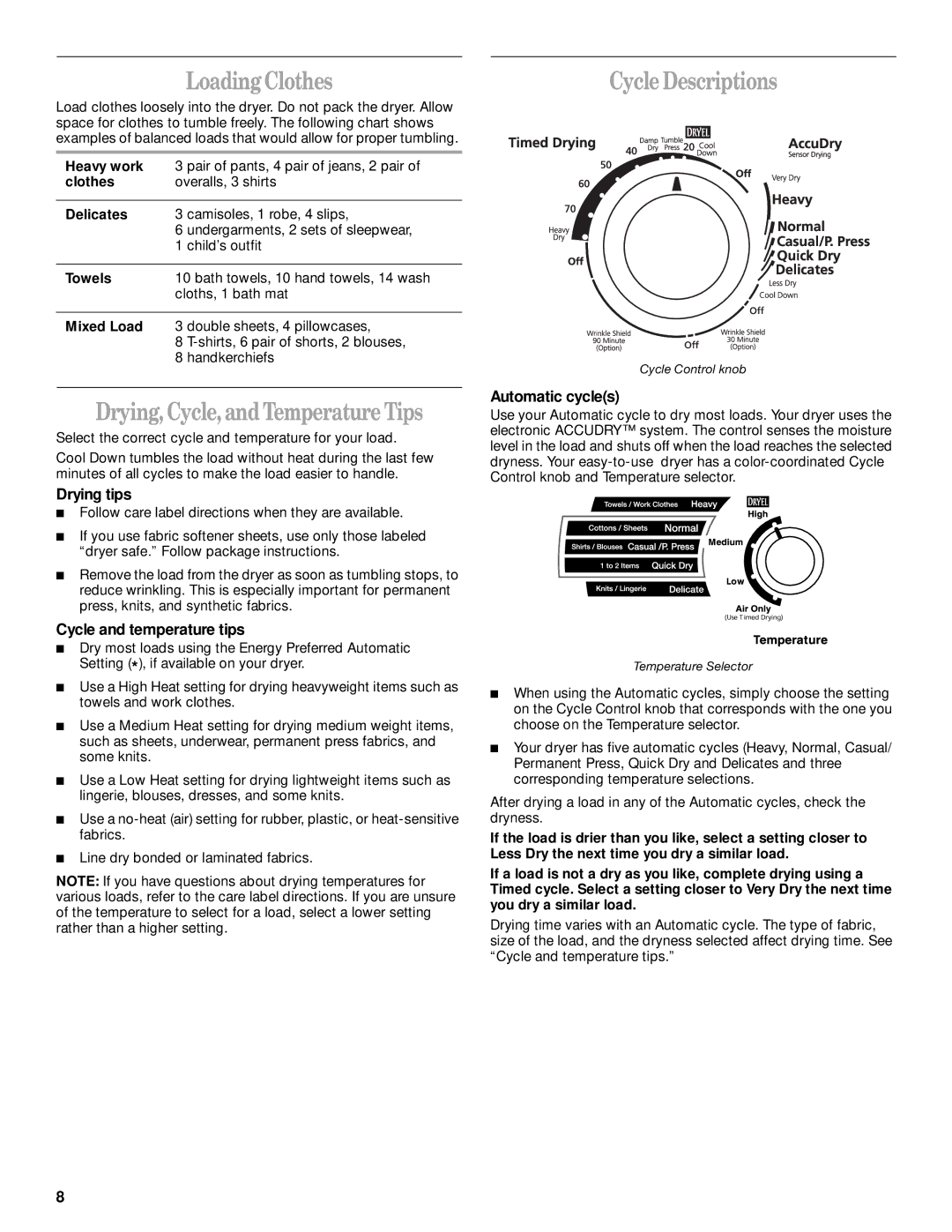
Loading Clothes
Load clothes loosely into the dryer. Do not pack the dryer. Allow space for clothes to tumble freely. The following chart shows examples of balanced loads that would allow for proper tumbling.
Heavy work | 3 pair of pants, 4 pair of jeans, 2 pair of |
clothes | overalls, 3 shirts |
|
|
Delicates | 3 camisoles, 1 robe, 4 slips, |
| 6 undergarments, 2 sets of sleepwear, |
| 1 child’s outfit |
|
|
Towels | 10 bath towels, 10 hand towels, 14 wash |
| cloths, 1 bath mat |
|
|
Mixed Load | 3 double sheets, 4 pillowcases, |
| 8 |
| 8 handk erchiefs |
Drying, Cycle,and Temperature Tips
Select the correct cycle and temperature for your load.
Cool Down tumbles the load without heat during the last few minutes of all cycles to mak e the load easier to handle.
Drying tips
■Follow care label directions when they are available.
■If you use fabric softener sheets, use only those labeled “dryer safe.” Follow pack age instructions.
■Remove the load from the dryer as soon as tumbling stops, to reduce wrink ling. This is especially important for permanent press, k nits, and synthetic fabrics.
Cycle and temperature tips
■Dry most loads using the Energy Preferred Automatic Setting (*), if available on your dryer.
■Use a High Heat setting for drying heavyweight items such as towels and work clothes.
■Use a Medium Heat setting for drying medium weight items, such as sheets, underwear, permanent press fabrics, and some k nits.
■Use a Low Heat setting for drying lightweight items such as lingerie, blouses, dresses, and some k nits.
■Use a
■Line dry bonded or laminated fabrics.
NOTE: If you have questions about drying temperatures for various loads, refer to the care label directions. If you are unsure of the temperature to select for a load, select a lower setting rather than a higher setting.
Cycle Descriptions
Cycle Control knob
Automatic cycle(s)
Use your Automatic cycle to dry most loads. Your dryer uses the electronic ACCUDRY™ system. The control senses the moisture level in the load and shuts off when the load reaches the selected dryness. Your
Temperature Selector
■When using the Automatic cycles, simply choose the setting on the Cycle Control k nob that corresponds with the one you choose on the Temperature selector.
■Your dryer has five automatic cycles (Heavy, Normal, Casual/ Permanent Press, Quick Dry and Delicates and three corresponding temperature selections.
After drying a load in any of the Automatic cycles, check the dryness.
If the load is drier than you like, select a setting closer to Less Dry the next time you dry a similar load.
If a load is not a dry as you like, complete drying using a Timed cycle. Select a setting closer to Very Dry the next time you dry a similar load.
Drying time varies with an Automatic cycle. The type of fabric, size of the load, and the dryness selected affect drying time. See “Cycle and temperature tips.”
8
